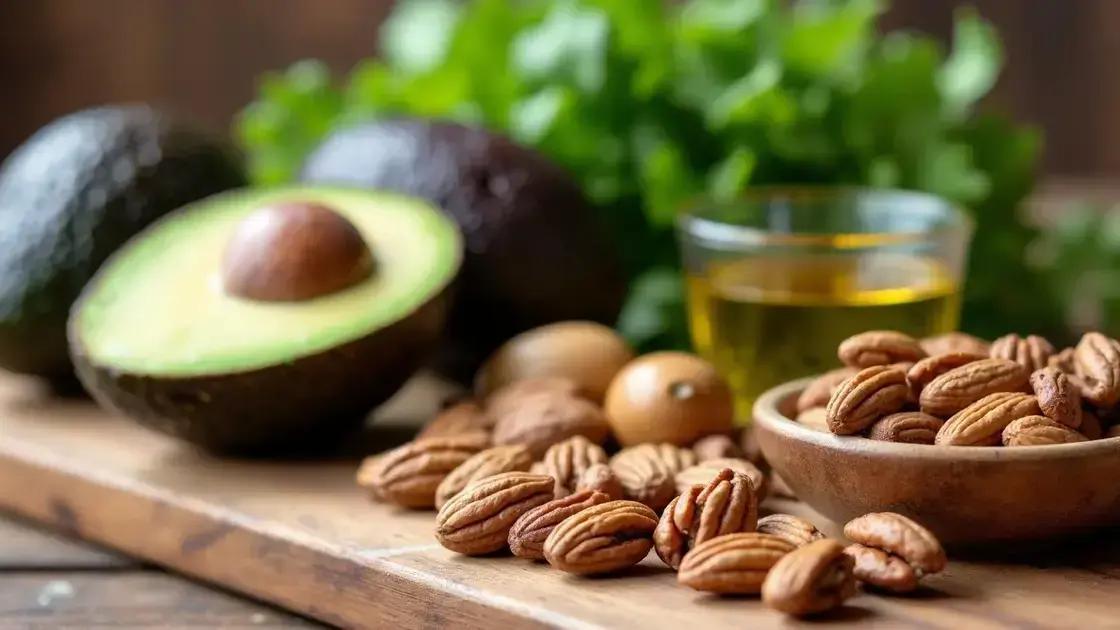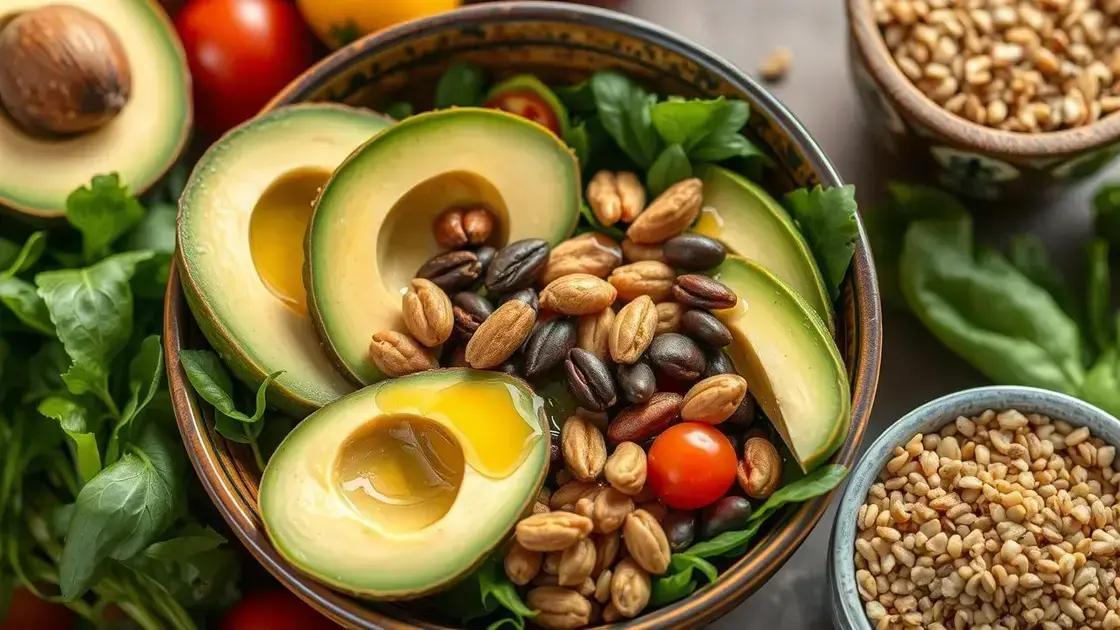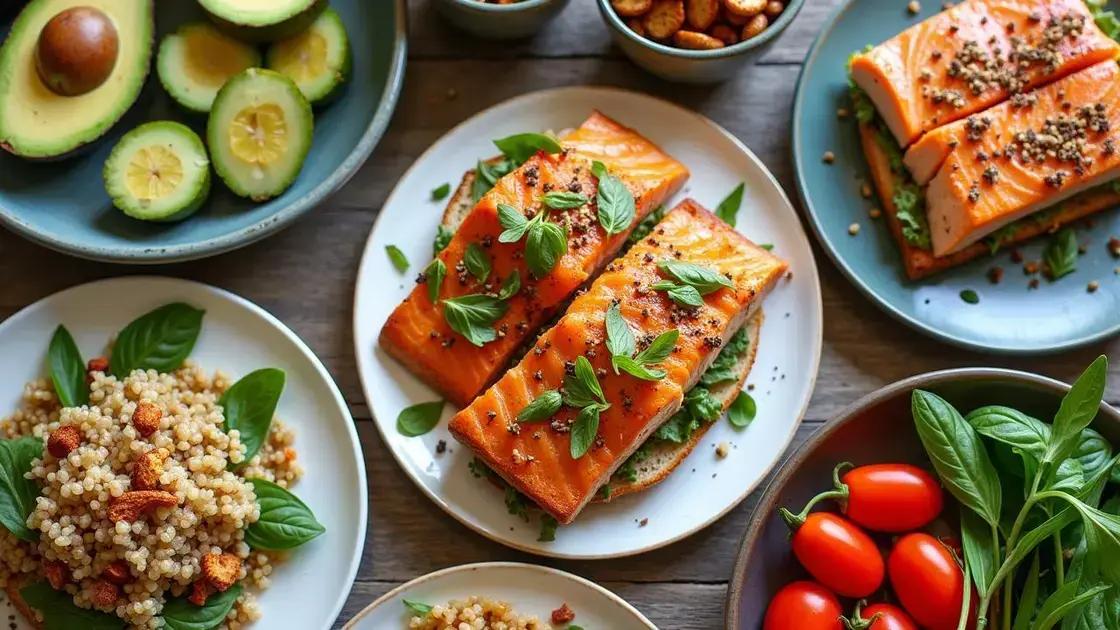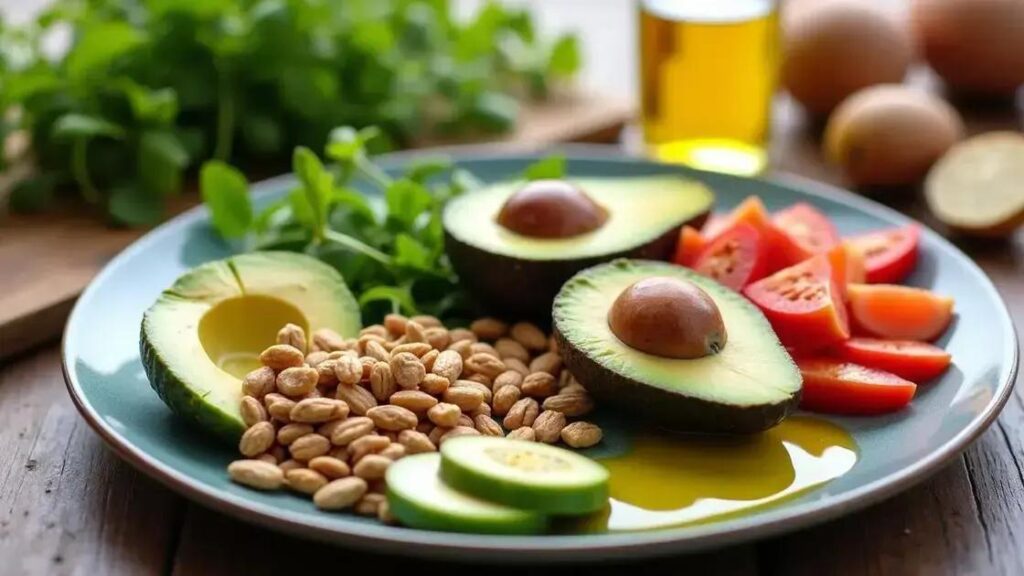To balance healthy fats for improved cholesterol levels, incorporate unsaturated fats from sources like olive oil, avocados, and nuts while limiting saturated and trans fats. Focus on whole foods, prepare nutritious recipes, and practice portion control to maintain heart health effectively.
Balancing healthy fats is crucial for improved cholesterol levels and overall heart health. In today’s fast-paced world, many struggle to understand the role that various fats play in their diets. This article dives deep into understanding healthy fats, their impact on cholesterol, and simple tips to balance your fat intake effectively. Plus, we’ll share delicious recipes that can help you on your journey to better cholesterol.
Understanding Healthy Fats

Understanding Healthy Fats is essential for managing cholesterol levels effectively. Healthy fats play a vital role in our diet, offering numerous benefits for heart health.
Types of Healthy Fats
There are two main types of healthy fats: monounsaturated fats and polyunsaturated fats. Monounsaturated fats can be found in foods like olive oil, avocados, and nuts. These fats help lower bad cholesterol levels while boosting good cholesterol.
On the other hand, polyunsaturated fats include omega-3 and omega-6 fatty acids, which are essential for body function and need to be obtained through diet. Sources of omega-3 fatty acids include fatty fish, flaxseeds, and walnuts.
The Importance of Healthy Fats
Incorporating healthy fats into your diet is important for various reasons. They assist in nutrient absorption, particularly for fat-soluble vitamins A, D, E, and K. Additionally, healthy fats provide energy and are crucial for cell growth and various bodily functions.
How Fats Affect Cholesterol Levels
Understanding how fats affect cholesterol is key. Unsaturated fats can improve blood cholesterol levels, but saturated and trans fats can raise bad cholesterol levels. To maintain healthy cholesterol, focus on consuming more unsaturated fats while limiting saturated fats from red meats and full-fat dairy products, as well as avoiding trans fats found in many processed foods.
Final Thoughts
When you include healthy fats in your diet, you not only support your cholesterol levels but also enhance your overall health. Learning to distinguish between healthy and unhealthy fats is a crucial step toward effective dietary changes.
The Impact of Fats on Cholesterol

The impact of fats on cholesterol is significant and can affect heart health directly. Not all fats are created equal, and understanding their roles is essential for managing cholesterol levels.
How Different Fats Affect Cholesterol
Unsaturated fats are beneficial and can help improve cholesterol levels. They reduce the amount of low-density lipoprotein (LDL), often called “bad” cholesterol, while increasing high-density lipoprotein (HDL), which is the “good” cholesterol.
Foods rich in unsaturated fats include avocados, olive oil, and nuts. Including these fats in moderation can lead to better cholesterol profiles.
Saturated Fats and Cholesterol Levels
In contrast, saturated fats can raise levels of LDL cholesterol. These fats are typically found in animal products such as fatty cuts of meat, full-fat dairy, and certain oils like coconut and palm oil. Limiting saturated fats is important to maintain a healthy cholesterol level.
The Role of Trans Fats
Trans fats are considered the worst type of fat for heart health. They are often found in processed foods, fried foods, and baked goods. Trans fats raise LDL cholesterol and lower HDL cholesterol, increasing the risk of heart disease. It is crucial to avoid trans fats to keep cholesterol levels in check.
Balanced Fat Intake for Optimal Cholesterol
To better manage cholesterol levels, focus on a balanced intake of healthy fats while minimizing saturated and trans fats. This approach can help reduce the risk of heart disease and support overall health. Monitoring fat consumption can lead to a healthier lifestyle and improved cholesterol levels.
Tips for Balancing Fats in Your Diet

Balancing fats in your diet is important for maintaining healthy cholesterol levels. Here are some practical tips to help you achieve this balance.
1. Choose Healthy Cooking Oils
When cooking, opt for oils that are rich in unsaturated fats, such as olive oil or canola oil. These oils can enhance flavor while helping to lower bad cholesterol.
2. Incorporate Avocados and Nuts
Add avocados and nuts to your meals. They are packed with healthy fats and can be added to salads, smoothies, or eaten as snacks. They provide nutrients and improve heart health.
3. Read Labels Carefully
Always check food labels for saturated and trans fats. Limit products that contain these harmful fats. Aim for food items that have low or no trans fats and moderate saturated fats.
4. Focus on Whole Foods
Consume whole and unprocessed foods. Fresh fruits, vegetables, whole grains, and lean proteins can significantly reduce unhealthy fat intake and enrich your diet with essential nutrients.
5. Limit Processed Foods
Reduce consumption of processed foods and fast foods, which often contain unhealthy fats. Preparing meals at home allows you to control the types of fats you include in your diet.
6. Balance Portion Sizes
Even healthy fats should be consumed in moderation. Be mindful of portion sizes when enjoying high-fat foods, such as nuts or nut butters, to maintain a balanced diet.
7. Mix Healthy Fats into Recipes
Incorporate healthy fats into your favorite recipes. For example, use ground flaxseeds in smoothies or spread avocado on toast. These small changes can make a big difference.
Healthy Recipes for Optimal Cholesterol

Incorporating healthy recipes into your diet can significantly help with maintaining optimal cholesterol levels. Here are some delicious and nutritious recipes to try.
1. Avocado Toast
Start your day with a nutritious avocado toast. Simply mash a ripe avocado and spread it on whole-grain bread. Top with sliced tomatoes, a sprinkle of salt, and some black pepper. You can also add a drizzle of olive oil for added flavor and healthy fats.
2. Quinoa Salad
This refreshing salad combines cooked quinoa, chopped cucumbers, bell peppers, and cherry tomatoes. Dress with lemon juice, olive oil, salt, and pepper. This dish is rich in fiber and healthy fats, making it great for heart health.
3. Baked Salmon
Bake a salmon fillet brushed with olive oil and topped with herbs like dill or parsley. Serve it with a side of steamed broccoli and brown rice for a fulfilling meal packed with omega-3 fatty acids.
4. Nutty Trail Mix
Create your own trail mix by combining a variety of nuts, like almonds and walnuts, with dried fruits such as cranberries or apricots. This snack is rich in healthy fats and perfect for keeping your energy up during the day.
5. Spinach and Chickpea Stir-Fry
Stir-fry fresh spinach with chickpeas, garlic, and a splash of olive oil until tender. Season with salt, pepper, and a pinch of red pepper flakes for a delightful and nutritious dish that supports heart health.
6. Homemade Hummus
Blend canned chickpeas, tahini, garlic, and olive oil until smooth to make hummus. Serve with fresh veggies or whole-grain pita for a healthy snack that’s high in protein and fiber.
7. Greek Yogurt Parfait
For a sweet treat, layer Greek yogurt with fresh berries and a sprinkle of nuts or seeds. This parfait not only tastes great but also packs a punch of protein and healthy fats.
In Summary: Balancing Healthy Fats for Better Cholesterol
Balancing healthy fats in your diet is crucial for improved cholesterol levels and overall heart health. Understanding the types of fats that benefit or harm cholesterol can guide you in making informed dietary choices.
Incorporating healthy recipes into your meals ensures you get the right types of fats while enjoying delicious flavors. Simple changes, like choosing better cooking oils, reading labels, and focusing on whole foods, can make a significant difference.
By focusing on healthy fats, minimizing unhealthy fats, and trying out various nutritious recipes, you can take proactive steps toward better heart health. Remember, every small change contributes to achieving and maintaining optimal cholesterol levels.
FAQ – Frequently Asked Questions About Balancing Healthy Fats for Improved Cholesterol
What are healthy fats and why are they important?
Healthy fats, such as monounsaturated and polyunsaturated fats, are important because they can improve cholesterol levels and support overall heart health.
How can I incorporate healthy fats into my diet?
You can incorporate healthy fats by using olive oil in cooking, adding avocados and nuts to meals, and choosing fatty fish like salmon.
What fats should I avoid to maintain better cholesterol levels?
Limit saturated fats found in animal products and avoid trans fats, which are often found in processed foods and margarine.
Are there specific recipes that promote healthy fats?
Yes, recipes like avocado toast, quinoa salad, and baked salmon are excellent options that include healthy fats beneficial for cholesterol.
How can reading food labels help me manage my fat intake?
Reading food labels allows you to identify and limit unhealthy fats, while ensuring you consume products with beneficial fats.
Why is portion control important when eating healthy fats?
Even healthy fats can add up in calories, so it’s important to practice portion control to maintain a balanced diet and manage weight.













